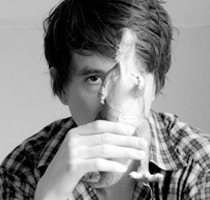Pop music is often criticized for its lack of sophistication and innovation, for its lack of clear social or spiritual utility. The conception of the pop song as shallow, aggravating media-morsel composed of simplistic progressions and lyrics and without redeeming value – “mere entertainment,” as some would have it – is a popular and pervasive one. People often look to poetry to provide the depth so often missing from what wails from the radio. However, Earworm pursues another tack, building similarities with the pop songs it discusses by employing an ethereal, barely-there quality – poems so light they seem to float along in consumable gulps, airy and insubstantial. In “It’s Not Easy for Her on the Phone to Describe…,” seven prose-like lines etch a fleeting portrait of distance between lovers, ending with the familiar sound of “steady rain over the roof” and “a car driv[ing] by.” “Your” father in the poem “Power” is described as wearing “fabulous cuffs” and “float[ing] on the air,” throwing “money” about in “heaven,” “waving his arms/ and … gather[ing] it up.” There’s not much more to the image than this; it’s drafted quickly and then dismissed. Beyond scant outlines of images and ideas, Thran carries other forms of lightness on his casual tone. In “Queen Street,” the speaker remarks that “Most of the staff has gone down/ with the flu. I’ve been reading Bolaňo’s The Savage Detectives/ and Liz, you would love it.” Not a whole lot happens in poems like “Queen Street,” but we do get a vivid sense of a neighbourhood “in transition,” an antique store going out of business, a man trying to “get his foot in the door of the fire department/ [to] start to fight some fires” (with its regrettable notes of class-based condescension somewhat souring the experience). Lightness can also translate to whimsy, as in “The Age of the Pineapple” (where the word pineapple stands in for what seems like everything under the sun) or in “Thought Bubbles Hovering Over the Canadian Taxidermists Association’s Annual General Meeting,” which is exactly what it sounds like, with its ‘bubbles’ firmly tongue-in-cheek and seemingly anachronistic.
In other poems, a lack of penetrating depth is replaced by erratic, yet appealing, variation, owing much to Whitman’s urban cataloging and its many re-imaginings throughout the American tradition. In “Origins of Gloss/ Through the Logic of Dreams/ During the Twilight of Periodicals,” Thran’s narrator begins with “No loop-de-looping around the gorgeous birds,” but “just gliding over a/ major city,” for “the public/ needs to see this,// a pigeon whispers.” This being the cornucopia of colour and design and beauty shimmering beneath the wings of a soaring eye, observing a breathing, living metropolis without judgment. In this instance, I’m powerfully reminded of Frank O’Hara’s famous poem “Sleeping on the Wing,” which begins as follows:
Perhaps it is to avoid some great sadness …
that one flies, soaring above the shoreless city,
veering upward from the pavement as a pigeon
does when a car honks or a door slams, the door
of dreams, life perpetuated in parti-colored loves
and beautiful lies all in different languages
Frank’s snappy, lunch-time tonality and tireless love of his environment makes for a decidedly joyous, atypically happy stanza. Similarly, Thran’s “Origins …” is at least “at ease” in its upfront encounter with the contemporary urban spectrum. In “Amanda Is the Sunshine That Keeps the Plants Alive,” “the city is swarming with couples; they huddle/ happily under the blossoms of multicoloured umbrellas,” recalling Thran’s city-street romanticism portrayed in the Bloor Street of Every Inadequate Name. And in “Reflective Neon Vest,” a first-person narrator describes his predicament (or mental environment) in the following way:
The space
I am
Thirty
Giddy
Perversely
Happy
Reflective neon
Hey
Because contentedness is so rarely expressed in ‘serious’ poetry, there is something refreshing about this kind of earnest calm. The happy restlessness with which Thran moves between images and ‘scenes’ can be intoxicating; in some cases, the effect is reminiscent of quickly alternating TV stations or frantically clicking through web browsers. “To Lean Into the Hands of the Second-Person Pronoun Is Also a Kind of Love” sends the reader leaping among couplets that conjure scenes as diverse as the Great Wall of China, cave hieroglyphics, basketball player Ray Allen, references to Rilke poems, Pink Floyd albums, firing squads, the ruins of Troy, Henri Cartier-Bresson photographs, and more. The poem takes “walls” as its subject: barriers of defense or ignorance, to keep things in and to push them out. A poem ostensibly about barriers that provides such a panoramic view of culture shows Thran’s understanding of a world in which traditional limitations between ideas and categories have loosened, creating that sort of messy exuberance we encounter in our daily living. Yes, there are “trickles of blood,” “screaming through walls,” and someone “murdered by dealers for a debt,” but such snippets of pain or suffering seem strangely removed, as if overheard through a dense veil; they dissolve in the joy of Ray Allen’s fifty-one points scored in a single game, or any number of methods we use to cope with the irreconcilable injustices constantly flickering around us.





Excellent article. keep it up!